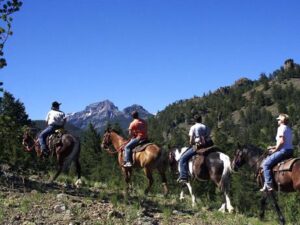By P. Jones
 The summer of 1966 was a pivotal year for me. I had finished high school and would enter the university in the fall. My summer plans involved getting a job to save money and enjoy what I would do. The local YMCA ran a summer camp and needed a horseback riding instructor.
The summer of 1966 was a pivotal year for me. I had finished high school and would enter the university in the fall. My summer plans involved getting a job to save money and enjoy what I would do. The local YMCA ran a summer camp and needed a horseback riding instructor.
When we lived in New Mexico, my father was in charge of the riding stables at Walker AFB in Roswell. Since I spent all summer at the stables and most weekends riding during school, I could feed, saddle, and instruct in the art of Western riding. My position as a senior camp counselor put me in charge of a bunkhouse full of campers, with two counselors under me to help. Before breakfast, I would rise early and hike to the corrals, where all of the hungry horses would meet me after a whistle or two. I fed horses at the barn and hiked back to the mess hall to eat with my campers, and then I would head back to the barn to gather horses and bridle them and bring them to a riding ring to await my first class of riders. My days were spent with 90-minute sessions, teaching novice riders, about ten years old, how to be safe while learning to brush the horses, saddle them, and then, over the two-week camp, learn to ride.
All horse-related activities required a knife, from opening feed sacks, cutting twine on hay bales, and sometimes cutting leather for a quick fix on a bridle or saddle that needed repair. My jeans were tight, and I often had to reach in my pocket for my 3-blade stock knife while balancing a hay bale on my knee or while restraining a horse that wanted to move away. At this point, I also decided to carry a sheath knife, thinking that two knives were better than one; the sheath knife might be better for prying, and the blade was longer. This knife, made in Solingen, Germany, had a 4-inch blade with the tip broken off and a handle of stacked leather washers. I am the only son of an only son, and the knife, like all of my guns and knives, was a gift from my beloved grandfather. This knife rode on my hip for several weeks and became the knife I used most since it was readily accessible and fast into action—not requiring two hands to open.
Other counselors involved in archery, boating, etc., may have carried a small pocketknife, but my fixed blade always drew glances and questions. The most common: Why do you carry that knife? My best answer was always the horses and their care. Then one day in the riding ring, I had ten horses spread out around the fence, tied by their bridles, and students were grooming the horses before riding. My job was to ensure safety by keeping the boys from walking behind the horse or another horse and getting kicked.
All was going well that day until a horse stepped on a boy’s foot, and somehow, the tennis shoelace got caught in the horseshoe. The boy pounded on the back of the horse’s leg to get his foot free and started yelling, and when the horse lifted his leg, the boy went along for the ride. The boy screamed. The horse put his foot down several times, attempting to rid himself of a 90-pound screaming anchor.
My student’s panic increased, which caused the horse to try to “throw off” the boy by raising its leg even higher and shifting its hindquarters around violently. I could imagine the horse breaking its reins and running off, dragging my student and stepping on him, putting his life in danger.
As I rushed to grab the boy upside-down by the waist to keep him safe from the hooves, I pulled my sheath knife out and quickly cut the tennis shoelace that tied the horse and the boy together. The rest of the day, my mind reeled with images of a boy being hurt during my classes, and I thanked God that my handy knife prevented an accident.
Since then, for the past 45 years, I have felt somewhat naked without a knife on my person, and I always carry a spare folder in my car for those few days a year when I rush away from home without a knife. In 63 years, I have never been sorry that I carried a knife, but often regretted the times I was without one.
Our thanks to P. Jones for sharing his story. Read about knife incidents in Knives Save Lives. Share with us why you carry your knife.